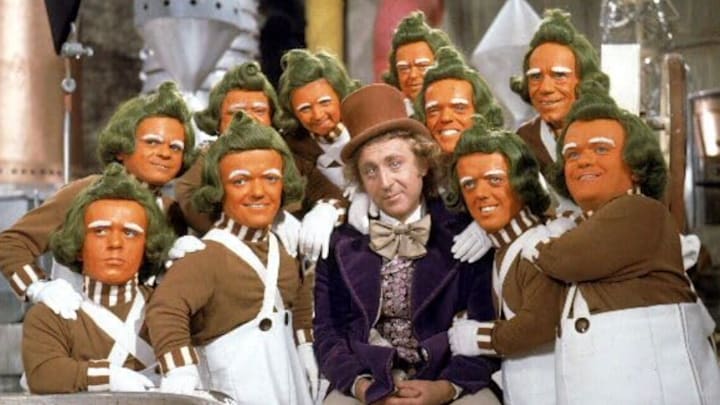Millions of cinephiles are currently enjoying the Technicolor wholesomeness of confectionary magnate origin tale Wonka, but is there more to the chocolate factory CEO than it seems?
A fan theory gaining traction online posits that Willy Wonka, the candy-loving eccentric that readers and viewers have come to know and love over the past six decades, might actually be a serial killer. The theory, inspired by the beloved 1971 film Willy Wonka & the Chocolate Factory, suggests that when Wonka launched his Golden Ticket scheme, finding a successor was not his main agenda: slaughtering some kids was.
Wonka’s factory tour does, after all, seem almost tailored to the flaws of the children who turn up—who fall into traps one by one, seemingly as a result of their own misbehavior. But isn’t it all a little too tidy that each kid’s worst traits—Augustus Gloop’s greed, Veruca Salt’s entitlement, Violet Beauregarde’s impatience, Mike Teevee’s square-eyed love of violence—coincide precisely with moments on the tour that feel perfectly designed to tempt them?
If that wasn’t enough, the Oompa-Loompas come out after each child’s disappearance and perform a song about them. If it was one Oompa-Loompa coming out and improvising a freestyle, sure, maybe that could be accepted as spontaneous. But a whole crew performing an impeccably choreographed song-and-dance routine based on a tragic incident that happened just moments before? It’s a little suspicious …
(Roald Dahl’s original 1964 book, Charlie and the Chocolate Factory, as well as Tim Burton’s 2005 film adaptation of the title, show the children at the end, all physically transformed by their traumatic afternoon but alive and relatively intact. It’s Gene Wilder’s Wonka alone who seems to be the monster here.)
Is Wonka a Jigsaw-esque maniac? If so, he’s fairly chill about it all, taking little delight when his pre-planned monstrous fates befall the children. In fact, his lackadaisical response to children being at least disfigured in front of him is a strong argument both for and against his possible psychopathy. On the one hand, he’s creepily unfazed by these events, which is deeply unsettling. But on the other, if you’d gone to all that trouble to contrive such an elaborately fatal scenario, wouldn’t you take some pleasure from it when it happened? Wilder’s Wonka barely pays any attention, when it feels like if you were such a committed killer that you’d written a special song to be performed after each murder, you’d at least watch. Which might just mean that instead of being a cold-blooded killer, Wonka is merely a deeply strange man.
The Oompa-Loompas, however, kick ass at improv.
